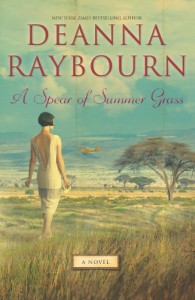 The opening lines of A Spear of Summer Grass are enough to entice most readers; they were enough to entice me.
The opening lines of A Spear of Summer Grass are enough to entice most readers; they were enough to entice me."Don't believe the stories you have heard about me. I have never killed anyone, and I have never stolen another woman's husband. Oh, if I find one lying around unattended, I might climb on, but I never took one that didn't want taking."
Based purely on those opening words the story of Delilah Drummond was begging to be read. Her story is predictable and even a bit cliché in parts but she is a pleasurable character with a very complex past. The problem with this book lies with the supporting characters and the some of the content which other readers may find offensive. There are extreme highs and lows within the story leaving this overall a very average read.
The highlight of the novel was Delilah herself. Her mother, referred to as “Mossy” was a scandalous woman who was frequently married and divorced leaving Delilah with no true father figure; they moved regularly as the novel refers to their lives in various countries and continents leaving Delilah with no true stability; she suffers loss and see tragedy at a very young age so is it really any wonder that her character is selfish and cold seeking pleasure without any true emotional attachment? It is natural that Delilah would protect herself by closing off to any emotional connection and instead rely on affairs with married men and marrying for money instead of love. She can’t be hurt if she doesn’t feel. This life works for the young Delilah until she finds herself too deep in scandal after the death of her most recent husband and is exiled to Africa and hidden away on the plantation of one of her previous step-fathers, Nigel. It is only here, in this untamed wilderness, away from the parties and the high society of Paris, that Delilah is able to find a new perspective and open herself up to true feelings of love.
The story itself is a bit cliché in parts. Delilah, one of the few white settlers in a savage Africa finds herself almost immediately inundated by African villagers who look to her as a medical savior. They expect to her to have “white medicine” and be able to heal all of their ailments. Since she worked for four years as a nurse during the war she is able to help them. It is a story arc that was included primarily to show Delilah’s growth and transformation as she grew from a selfish promiscuous tart to a compassionate woman. It is reminiscent of many other African fiction novels and does not offer anything unique to A Spear of Summer Grass. It is a underlying storyline, a mild arc really, that is included to teach Delilah love and compassion. I enjoyed it despite it being a bit formula and predictable.
There are moments in the story that I suspect may offend other readers. During a scene with Delilah and Ryder (another central character – a long-haired and gritty white man prominent in Africa) he threatens her and states that he could have his way with her and then throw her body to the hyenas. Out of context it’s an offensive threat of rape but within the context of the novel it’s an idle threat (considering what the reader has learned of Ryder’s character) that calls attention to Delilah’s promiscuity and her habit of sexually teasing men in order to have them at her beck and call. That may have worked in Paris but she’s now living in Africa and there is a different culture and new threats. The same applies to mentions of domestic violence. The reader must consider the setting, the characters and the intent or it may be offensive.
It’s historic (set in the mid 1920’s), it’s cultural (with a setting in the wilds of Africa) and it tells the story of a young woman who finds her purpose in the most unlikely of situations. It’s worth a read.
Review by Ashley LaMar
Closed the Cover




